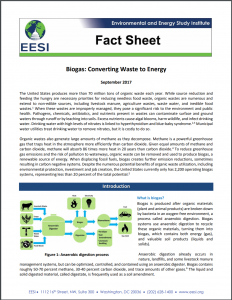Full Title: Biogas: Converting Waste to Energy
Author(s):
Publisher(s): Environmental and Energy Study Institute
Publication Date: September 1, 2017
Full Text: Download Resource
Description (excerpt):
The United States produces more than 70 million tons of organic waste each year. While source reduction and feeding the hungry are necessary priorities for reducing needless food waste, organic wastes are numerous and extend to non-edible sources, including livestock manure, agriculture wastes, wastewater, and inedible food wastes. When these wastes are improperly managed, they pose a significant risk to the environment and public health. Pathogens, chemicals, antibiotics, and nutrients present in wastes can contaminate surface and ground waters through runoff or by leaching into soils. Excess nutrients cause algal blooms, harm wildlife, and infect drinking water. Drinking water with high levels of nitrates is linked to hyperthyroidism and blue-baby syndrome. Municipal water utilities treat drinking water to remove nitrates, but it is costly to do so.
Organic wastes also generate large amounts of methane as they decompose. Methane is a powerful greenhouse gas that traps heat in the atmosphere more efficiently than carbon dioxide. Given equal amounts of methane and carbon dioxide, methane will absorb 86 times more heat in 20 years than carbon dioxide. To reduce greenhouse gas emissions and the risk of pollution to waterways, organic waste can be removed and used to produce biogas, a renewable source of energy. When displacing fossil fuels, biogas creates further emission reductions, sometimes resulting in carbon-negative systems. Despite the numerous potential benefits of organic waste utilization, including environmental protection, investment and job creation, the United States currently only has 2,200 operating biogas systems, representing less than 20 percent of the total potential.
